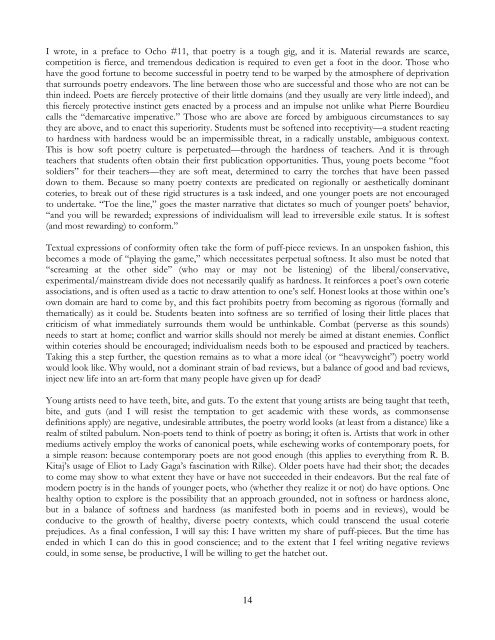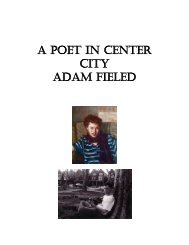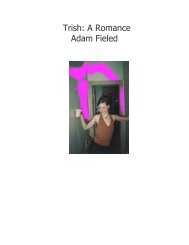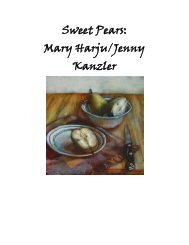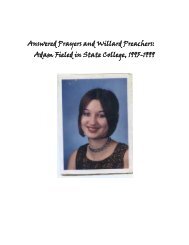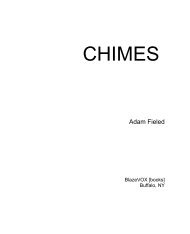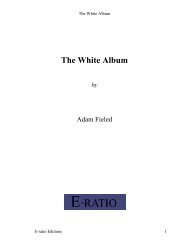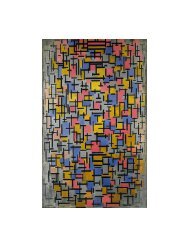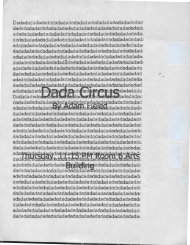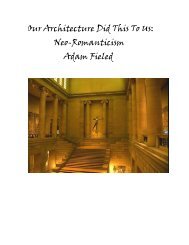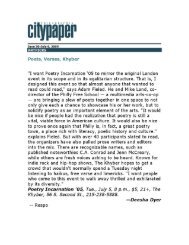3 E-Books: The Argotist Online
These three Adam Fieled collections, The Posit Trilogy, Mother Earth, and Disturb the Universe: The Collected Essays of Adam Fieled, were released in e-book form by The Argotist Online, in 2017, 2011, and 2010, respectively.
These three Adam Fieled collections, The Posit Trilogy, Mother Earth, and Disturb the Universe: The Collected Essays of Adam Fieled, were released in e-book form by The Argotist Online, in 2017, 2011, and 2010, respectively.
You also want an ePaper? Increase the reach of your titles
YUMPU automatically turns print PDFs into web optimized ePapers that Google loves.
I wrote, in a preface to Ocho #11, that poetry is a tough gig, and it is. Material rewards are scarce,<br />
competition is fierce, and tremendous dedication is required to even get a foot in the door. Those who<br />
have the good fortune to become successful in poetry tend to be warped by the atmosphere of deprivation<br />
that surrounds poetry endeavors. <strong>The</strong> line between those who are successful and those who are not can be<br />
thin indeed. Poets are fiercely protective of their little domains (and they usually are very little indeed), and<br />
this fiercely protective instinct gets enacted by a process and an impulse not unlike what Pierre Bourdieu<br />
calls the “demarcative imperative.” Those who are above are forced by ambiguous circumstances to say<br />
they are above, and to enact this superiority. Students must be softened into receptivity—a student reacting<br />
to hardness with hardness would be an impermissible threat, in a radically unstable, ambiguous context.<br />
This is how soft poetry culture is perpetuated—through the hardness of teachers. And it is through<br />
teachers that students often obtain their first publication opportunities. Thus, young poets become “foot<br />
soldiers” for their teachers—they are soft meat, determined to carry the torches that have been passed<br />
down to them. Because so many poetry contexts are predicated on regionally or aesthetically dominant<br />
coteries, to break out of these rigid structures is a task indeed, and one younger poets are not encouraged<br />
to undertake. “Toe the line,” goes the master narrative that dictates so much of younger poets’ behavior,<br />
“and you will be rewarded; expressions of individualism will lead to irreversible exile status. It is softest<br />
(and most rewarding) to conform.”<br />
Textual expressions of conformity often take the form of puff-piece reviews. In an unspoken fashion, this<br />
becomes a mode of “playing the game,” which necessitates perpetual softness. It also must be noted that<br />
“screaming at the other side” (who may or may not be listening) of the liberal/conservative,<br />
experimental/mainstream divide does not necessarily qualify as hardness. It reinforces a poet’s own coterie<br />
associations, and is often used as a tactic to draw attention to one’s self. Honest looks at those within one’s<br />
own domain are hard to come by, and this fact prohibits poetry from becoming as rigorous (formally and<br />
thematically) as it could be. Students beaten into softness are so terrified of losing their little places that<br />
criticism of what immediately surrounds them would be unthinkable. Combat (perverse as this sounds)<br />
needs to start at home; conflict and warrior skills should not merely be aimed at distant enemies. Conflict<br />
within coteries should be encouraged; individualism needs both to be espoused and practiced by teachers.<br />
Taking this a step further, the question remains as to what a more ideal (or “heavyweight”) poetry world<br />
would look like. Why would, not a dominant strain of bad reviews, but a balance of good and bad reviews,<br />
inject new life into an art-form that many people have given up for dead?<br />
Young artists need to have teeth, bite, and guts. To the extent that young artists are being taught that teeth,<br />
bite, and guts (and I will resist the temptation to get academic with these words, as commonsense<br />
definitions apply) are negative, undesirable attributes, the poetry world looks (at least from a distance) like a<br />
realm of stilted pabulum. Non-poets tend to think of poetry as boring; it often is. Artists that work in other<br />
mediums actively employ the works of canonical poets, while eschewing works of contemporary poets, for<br />
a simple reason: because contemporary poets are not good enough (this applies to everything from R. B.<br />
Kitaj’s usage of Eliot to Lady Gaga’s fascination with Rilke). Older poets have had their shot; the decades<br />
to come may show to what extent they have or have not succeeded in their endeavors. But the real fate of<br />
modern poetry is in the hands of younger poets, who (whether they realize it or not) do have options. One<br />
healthy option to explore is the possibility that an approach grounded, not in softness or hardness alone,<br />
but in a balance of softness and hardness (as manifested both in poems and in reviews), would be<br />
conducive to the growth of healthy, diverse poetry contexts, which could transcend the usual coterie<br />
prejudices. As a final confession, I will say this: I have written my share of puff-pieces. But the time has<br />
ended in which I can do this in good conscience; and to the extent that I feel writing negative reviews<br />
could, in some sense, be productive, I will be willing to get the hatchet out.<br />
14


